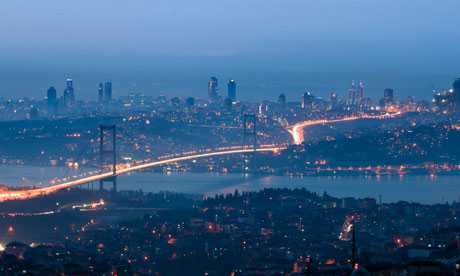By JOHN VINOCUR
It meant, in their eyes, Europe literally extending its frontiers to the borders of Iran, Syria and Iraq, and the E.U. adding to its membership a predominantly Muslim country whose population would soon give it the biggest number of seats in the European Parliament. As for Turkey’s government, its uncertain relationship with democracy was exemplified by 57 journalists in jail — more, at last count by international watchdogs, than either China or Iran.
Now, at an increasing pace over the last six months, Turkey is portraying itself as a regional power in the Middle East, threatening to send its ships to challenge Cypriot or Israeli gas exploration rights in the Mediterranean, talking up “an axis” with Egypt, and warning of a “real crisis” with the E.U. if it allows the Republic of Cyprus to hold, as scheduled, its six-month rotating presidency next year. To its backers in Europe, this Turkey can no longer look much like an idealized bridge to a world beyond clashes of civilizations.
In the opposite direction, surveying a weakened and divisive Europe, whose resolve and forthrightness are in question as it stumbles from nonsolution to nonsolution of its economic and financial crises, the Turkish president, Abdullah Gul, insists his country has accumulated as much political influence internationally as the entire E.U. combined.
So? In the very short term, Turkey’s new stance gives Europe (with Germany and France opposing full Turkish membership) a respectable alibi and respite from an issue it cannot easily solve. But in the process, the door closes on the goal of integrating Turkey into a European-led geopolitical and economic order.
“The majority of Europe welcomes the moment, thinking, ‘Great, the Turkey thing is off the table,”’ said a Brussels official whose country backs Turkish entry. He added, “We think Turkey is worth it, and that they’re a real risk if they sail off into the distance.”
All the same, a new distance has unspoken pluses.
The apocalyptic notion of Europe being overrun by Turkish Muslims, brandished by right-wing populists like Geert Wilders of the Netherlands — Turkey’s rapidly growing population is approaching 80 million — is deflated as a hysteria-making political argument.
Reality also says the European Union couldn’t handle two existential issues at one time. The magnitude of the problems represented by Turkish entry into full-fledged membership (Germany talks instead of a “privileged partnership”) appears incompatible with the E.U.’s unresolved issues of debt and deficit, an economy nearing standstill by the end of the year, and an intensifying discussion of the need for greater economic governance.
The Obama administration, so far, can praise Prime Minister Recep Tayyip Erdogan’s “great leadership,” be happy that Turkey will be part of a U.S. antimissile defense system, and disregard Mr. Erdogan’s Putin-style remark that there are only “presumptions” about Iranian nuclear weapons intentions.
Yet the question of Turkey’s new engagement in the Arab world, its falling out with Israel, and general bluster is a more intimate one for Europe. Some Europeans would like to minimize the problem.
The Brussels official who found a majority of E.U. members liking the idea that Turkey’s entry seems shelved for now — I spoke to a cabinet minister from another E.U. core country who agreed — described Turkish assertiveness as “tactics, not strategy,” and part of an expression of Turkey’s irritation with Europe’s resistance to it.
The Finnish foreign minister, Erkki Tuomioja, has pointed in the same direction and asserts, “Turkey doesn’t have the means for its policy.”
But if you take Turkey’s Middle East power ambitions as serious — and not blowhard fantasizing — then it is the Turks who are forcing the E.U. to turn away from its candidacy. Foreign Minister Ahmet Davutoglu has said, “A Turkey that wants to become a regional power must build up its political and economic influence on the waterways from the Agean to the Adriatic and from the Suez Canal to the Persian Gulf.”
The leading German research organization for international politics and security affairs, SWP, takes the point. It published a paper two weeks ago, titled “Turkey on a Course of Confrontation,” whose introduction reads, “Ankara is looking to pick a fight in the Mediterranean not only with Israel and the Republic of Cyprus, but also with the European Union.”
The same week, Mr. Gul, while rejecting anything short of full E.U. membership during a visit to Germany, sounded provocative about his hosts’ approach to Turkish immigration. He described as a violation of “human rights” a German regulation requiring spouses of Turks living in Germany to pass German-language competency tests before taking up residence.
Earlier in the year, Mr. Erdogan, as a guest of Angela Merkel, had an imperative-type message for Turkish immigrants: “Integrate yourselves into German society, but don’t assimilate.”
Finding an overall response to the new circumstances is not easy.
Last week, NATO’s secretary general, Anders Fogh Rasmussen, both chose to praise Turkey’s “stabilizing role in the region” and dodge the issue of its charter member’s warning that it might send its navy toward non-NATO Cyprus to block its exploration for gas. He said the alliance “as an organization is not going to interfere in these disputes.”
On this matter, at least — if it sees a measure of immediate comfort in Turkey talking itself out of closer association anytime soon — the E.U. can ignore an active Turkish challenge to a tiny member’s sovereignty only at the expense of its self-respect.
